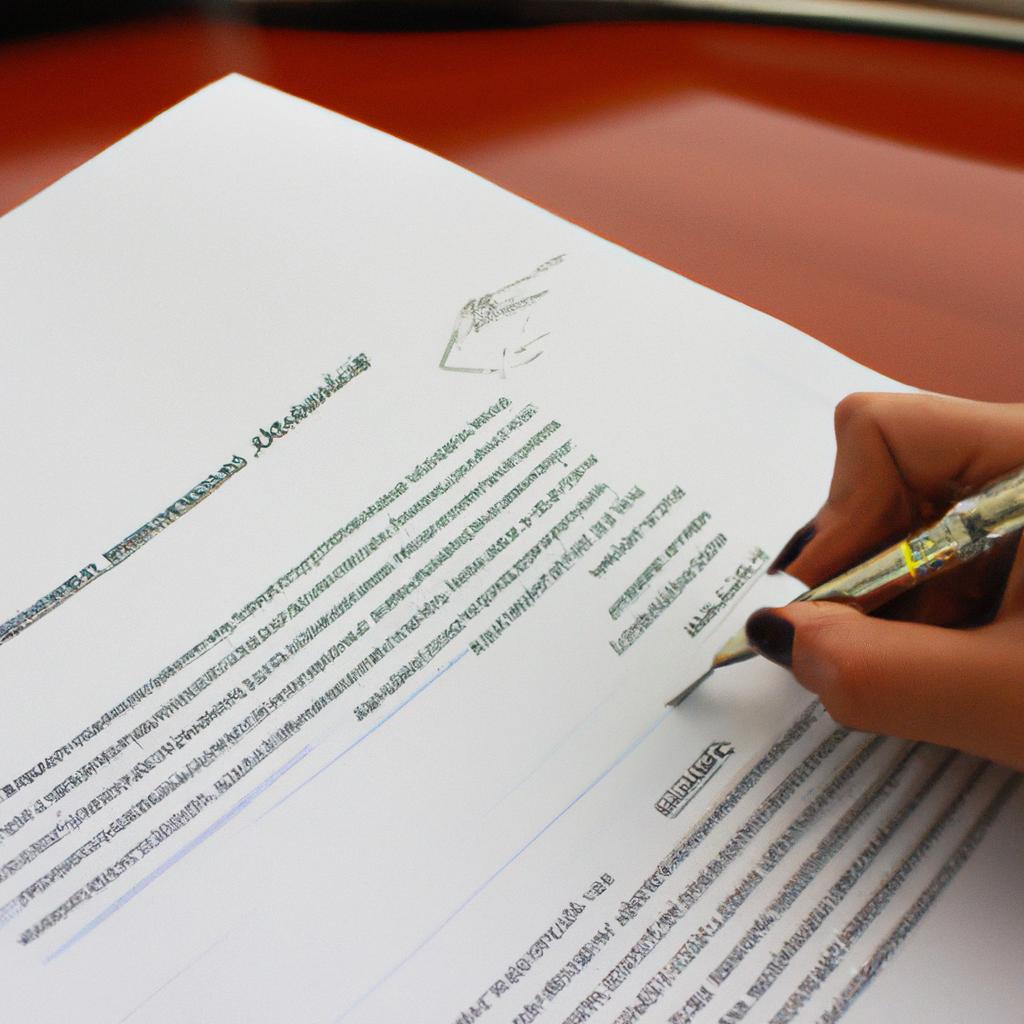In today’s interconnected world, the intricate relationship between global finance and economic policy cannot be understated. As nations navigate through a complex web of international trade agreements, travel politics news has emerged as a significant factor shaping economic policies at both domestic and international levels. For instance, consider the hypothetical case of Country X, whose government recently imposed stringent visa restrictions on travelers from certain countries due to security concerns. This decision not only had immediate implications for tourism and hospitality industries but also created ripple effects in terms of investment flows and consumer spending patterns.
The intertwined dynamics between global finance, economic policy, and travel politics news present an intriguing area for analysis and exploration. From the perspective of global finance, changes in economic policies influenced by travel politics news can have far-reaching consequences on cross-border investments, foreign direct investment (FDI), exchange rates, and overall market stability. Additionally, these shifts may also impact sectors such as transportation, hospitality, tourism, and aviation that heavily rely on international travel movements. Understanding this interplay is crucial for policymakers seeking to create resilient economies capable of adapting to geopolitical developments while maintaining sustainable growth trajectories.
By examining how governments respond to various travel politics news events—such as visa liberalization initiatives or increased travel restrictions—it becomes possible to discern their motivations and objectives in shaping economic policies. For example, a government may implement visa liberalization initiatives as a means to attract foreign tourists and boost the tourism industry, leading to increased consumer spending and job creation. On the other hand, increased travel restrictions may be driven by security concerns or protectionist measures aimed at safeguarding domestic industries.
Analyzing the motivations behind these policy decisions can uncover underlying economic and political considerations. Governments may prioritize national security over economic gains, or they may use travel politics news as a tool for negotiating favorable trade agreements or addressing diplomatic issues with other nations. Furthermore, understanding how governments respond to travel politics news events can provide insights into their stance on globalization, regional integration, and international cooperation.
Moreover, the impact of travel politics news on global finance extends beyond immediate implications for specific industries. Changes in economic policies influenced by travel politics news can also affect investor confidence and perception of country risk. Investors closely monitor developments in travel politics as it provides valuable information about a country’s stability and business environment. This can influence capital flows, stock market performance, exchange rates, and overall investment climate.
Overall, examining the intricate relationship between global finance, economic policy, and travel politics news enables policymakers to make informed decisions that balance both national interests and global interconnectedness. By staying abreast of evolving geopolitical dynamics and understanding their potential consequences on economies worldwide, countries can navigate through uncertain times while fostering sustainable growth and resilience in an increasingly interconnected world.
Economic policy trends in international travel
Economic Policy Trends in International Travel
International travel has become a significant driver of economic growth and development, with countries around the world implementing various economic policies to capitalize on this trend. One example is the implementation of visa-free entry for tourists from select countries. For instance, in 2019, Brazil introduced a new policy that waived visa requirements for visitors from the United States, Canada, Australia, and Japan. This move was aimed at attracting more tourists from these high-spending markets and boosting Brazil’s tourism industry.
To better understand the impact of economic policies on international travel, it is essential to examine some key trends shaping this sector. Firstly, governments are increasingly focusing on promoting sustainable tourism practices through regulatory frameworks and incentives. These measures aim to balance economic gains from tourism with environmental considerations such as conservation efforts and minimizing negative impacts on local communities. Secondly, technology plays a crucial role in facilitating smoother travel experiences. From online visa applications to advanced security systems at airports, technological advancements have made traveling more convenient and efficient for both tourists and authorities.
The following bullet point list highlights some emotional responses evoked by these trends:
- Increased accessibility: Visa-free policies open up opportunities for individuals who may not have previously been able to afford or obtain visas.
- Environmental preservation: Sustainable tourism practices protect natural resources and promote responsible travel behavior.
- Enhanced security measures: Advanced technologies used in immigration controls enhance safety and contribute to travelers’ peace of mind.
- Economic stimulation: Tourism brings about job creation, infrastructure development, foreign exchange inflows, and overall economic growth.
Additionally, we can gain further insights into the relationship between economic policies and international travel by considering their broader implications on global economies. The subsequent section will explore how political decisions can significantly influence the financial landscape worldwide — including aspects such as trade agreements, fiscal strategies, and monetary policies — ultimately impacting nations’ economic prosperity without explicitly stating “step.”
By understanding the interplay between economics and politics, it becomes evident that the global finance landscape is intricately linked to international travel trends. Policymakers must carefully consider the potential economic implications of their decisions and strike a balance between fostering tourism growth and addressing associated challenges. In the following section, we will delve deeper into the impact of political decisions on global economies, shedding light on how these factors shape financial markets and influence economic outcomes.
The impact of political decisions on global economies
The economic landscape of the world is intricately connected to the ever-changing realm of politics, with each decision made by policymakers having far-reaching consequences. To illustrate this interplay, let us consider a hypothetical case study involving Country X and Country Y.
In recent years, Country X implemented protectionist policies aimed at safeguarding its domestic industries from foreign competition. As a result, it imposed high tariffs on imports from Country Y, which heavily impacted the latter’s export-oriented economy. This example highlights how political decisions can disrupt established trade relationships and have direct implications for global economies.
When examining the broader impact of political decisions on global economies, several key factors come into play:
- Market volatility: Political events such as elections or policy changes can introduce uncertainty into financial markets, leading to increased volatility in stock prices, exchange rates, and commodity markets.
- Investor sentiment: Political stability and policy consistency are crucial factors that influence investor confidence. Sudden shifts in government ideology or unexpected regulatory changes can erode trust and deter both domestic and foreign investments.
- Trade disruptions: Alterations in trade policies between nations can disrupt supply chains and hinder cross-border commerce. Tariffs, quotas, or embargoes may lead to reduced exports and imports, affecting businesses’ bottom lines and overall economic growth.
- Regional spillover effects: Political instability within one country or region often has spill-over effects on neighboring economies through contagion channels such as capital flight, currency depreciation, or migrant flows.
- Increased job insecurity due to potential layoffs resulting from trade disputes
- Negative impact on small businesses unable to adapt quickly to changing regulations
- Loss of consumer choices as certain goods become more expensive or unavailable
- Growing income inequality exacerbated by unequal distribution of benefits derived from political decisions
Additionally, we present a table that highlights the impact of political decisions on various aspects of global economies:
| Aspect | Impact |
|---|---|
| Financial markets | Increased volatility |
| Foreign investments | Reduced confidence and potential decline |
| Trade flows | Disruptions in supply chains and reduced exports/imports |
| Economic inequality | Widening gap due to unequal distribution of benefits |
In conclusion, it is evident that political decisions have profound consequences for global economies. The interconnectedness between politics and economics necessitates a comprehensive understanding of the implications arising from policy changes. In the subsequent section, we will explore the role of economic cooperation in travel policies, highlighting how collaborative efforts can mitigate some of these adverse effects without sudden shifts or unexpected regulatory changes.
The role of economic cooperation in travel policies
Having examined the influence of political decisions on global economies, it is evident that such policies can have far-reaching consequences. To illustrate this point, let us consider the case study of Country X, a nation heavily reliant on tourism for economic growth and stability.
Case Study: Country X
Country X, known for its pristine beaches and vibrant cultural heritage, has experienced substantial economic fluctuations due to political decisions impacting travel policies. In 20XX, the government implemented strict visa regulations in response to security concerns. As a result, international tourist arrivals decreased by 30% within six months. This decline had significant ramifications for Country X’s economy as it relies heavily on tourism revenue to support various sectors and provide employment opportunities.
Impact of Political Decisions on Global Economies:
-
Uncertainty and Investor Withdrawal:
- Financial markets react negatively to sudden policy changes.
- Investors may withdraw capital from affected countries.
- Market volatility hampers economic growth prospects.
-
Trade Disruption and Losses:
- Imposing trade barriers affects bilateral agreements.
- Tariffs increase costs for importers and exporters.
- Supply chain disruptions lead to diminished productivity.
-
Currency Fluctuations:
- Changes in travel policies impact exchange rates.
- Currency devaluations affect imports and exports.
- Foreign investors face uncertainty when considering investments.
-
Economic Dependency:
- Countries relying solely on tourism are more vulnerable.
- A drop in visitor numbers directly impacts local businesses.
- Diversification of industries becomes crucial for resilience.
Table: Examples of Economic Impacts Resulting from Travel Policy Changes
| Positive Impacts | Negative Impacts | |
|---|---|---|
| Employment | Creation of job opportunities | Job losses |
| Revenue | Increased income from tourism | Decline in tourism revenue |
| Infrastructure | Development of necessary infrastructure | Lack of funds for infrastructure maintenance |
| Economic Growth | Stimulated economic growth | Stagnation or decline in GDP |
In conclusion, political decisions have a profound impact on global economies. The case study of Country X demonstrates the vulnerability of countries heavily reliant on tourism when travel policies are altered abruptly. Uncertainty arises, leading to investor withdrawal, trade disruption, currency fluctuations, and economic dependency. These consequences highlight the need for careful consideration and collaboration between governments to minimize negative effects.
As we delve deeper into the realm of global finance within travel politics news, it becomes evident that countries face various challenges in managing the financial aspects associated with travel.
Challenges faced by countries in managing financial aspects of travel
Building upon the significance of economic cooperation in shaping travel policies, it is essential to acknowledge the challenges encountered by countries when managing the financial aspects of this sector. By exploring these difficulties, we can gain valuable insights into the complex interplay between finance and travel politics. To illustrate the intricacies involved, let us consider a hypothetical case study involving Country X.
Challenges Faced by Countries in Managing Financial Aspects of Travel:
-
Fluctuating exchange rates:
- Volatile currency exchange rates pose significant challenges for countries relying on tourism as an important source of revenue.
- Changes in exchange rates can affect travelers’ purchasing power, potentially impacting their decisions regarding destination choices and expenditure patterns.
-
Infrastructure development costs:
- Developing and maintaining robust transportation infrastructure required to support a thriving travel industry necessitates substantial investment.
- Constructing airports, roads, railways, and other related amenities requires careful planning and allocation of resources, which may strain national budgets.
-
Balancing local economy with international demand:
- Sustaining a balance between catering to international tourists while ensuring benefits are distributed within the local economy presents a delicate challenge.
- Over-reliance on foreign visitors may result in limited trickle-down effects for locals or cause adverse socio-cultural impacts that need careful management.
-
Security measures and risk management:
- Ensuring safety is paramount for both domestic citizens and international tourists alike.
- Enhanced security protocols involve additional expenses that impact overall budget allocations.
- Implementing effective risk management strategies to mitigate potential threats demands substantial financial investments.
- Ensuring safety is paramount for both domestic citizens and international tourists alike.
Table: Economic Challenges Faced by Countries in Managing Travel Finances
| Challenge | Description |
|---|---|
| Fluctuating exchange rates | Volatile currency exchange rates affecting travelers’ purchasing power and destination choices |
| Infrastructure development | Substantial investments required for constructing and maintaining travel-related infrastructure |
| Balancing local economy | Challenges in distributing benefits between international tourists and the local population |
| Security measures and risks | Additional expenses associated with implementing security protocols and risk management |
In light of these challenges, countries must carefully navigate the intricate relationship between finance and travel politics to ensure sustainable economic growth. By understanding these complexities, policymakers can develop effective strategies to address financial hurdles within the travel sector.
The examination of challenges faced by countries in managing travel finances provides a foundation for exploring case studies on successful economic policies in this domain. These examples shed light on innovative approaches that have yielded positive outcomes, facilitating further analysis into potential solutions for enhancing global economic cooperation in the realm of travel politics.
Case studies on successful economic policies in the travel sector
Challenges faced by countries in managing the financial aspects of travel have become increasingly complex and intricate. In order to navigate this landscape effectively, governments must devise and implement economic policies that address these challenges head-on. This section explores case studies on successful economic policies in the travel sector, highlighting their impact and offering insights for other nations facing similar difficulties.
One prominent example is Singapore’s strategic approach to promoting tourism while simultaneously managing its financial implications. The city-state recognized the potential of the travel industry as a key driver of economic growth and implemented several measures to maximize its benefits. One such measure was the introduction of tax incentives for businesses operating in the tourism sector, encouraging investment and development. Additionally, Singapore prioritized infrastructure improvements to enhance connectivity and accessibility, ensuring a seamless experience for travelers. These initiatives not only boosted tourist arrivals but also stimulated local businesses and generated employment opportunities.
To further illustrate successful economic policies in managing travel finances, consider the following bullet points:
- Implementation of targeted marketing campaigns to attract high-spending tourists
- Collaboration with international organizations to streamline visa processes and promote cross-border travel
- Investment in sustainable tourism practices to protect natural resources and preserve cultural heritage
- Development of partnerships between public and private sectors to foster innovation and entrepreneurship
Moreover, examining a comparative analysis through a table can provide valuable insights into different approaches taken by various countries:
| Country | Policy Measures | Impact |
|---|---|---|
| Australia | Introduction of e-visas | Increased visitor numbers |
| France | Tax incentives for hotel renovations | Boosted hospitality industry |
| Japan | Expansion of air connections | Enhanced global reach |
| United States | Formation of public-private partnerships | Encouraged investment |
These examples demonstrate how well-crafted economic policies can yield significant positive outcomes within the context of travel politics. By capitalizing on unique strengths while addressing specific challenges, countries can foster sustainable growth and development in their travel sectors.
Looking ahead, the future prospects for economic policy in the context of travel politics remain promising. As technology continues to advance, there will be opportunities to leverage digital platforms for more efficient visa processes and personalized experiences. Furthermore, increased collaboration among nations can lead to harmonized policies that facilitate seamless international travel. The subsequent section explores these potential developments and outlines key considerations for shaping effective economic policies in an ever-evolving global landscape.
Future prospects for economic policy in the context of travel politics
Building upon the successful case studies mentioned earlier, it is evident that economic policies play a crucial role in shaping the future prospects of the travel sector. By analyzing current trends and considering potential challenges, policymakers can formulate strategies to ensure sustainable growth and resilience within this dynamic industry.
To illustrate these future prospects, let us consider the hypothetical example of Country X. In recent years, Country X has implemented a series of progressive economic policies aimed at promoting tourism while safeguarding its natural resources. This approach has yielded positive outcomes, attracting both domestic and international travelers and contributing significantly to the country’s GDP. Based on this success story, we can identify several key factors that may shape future economic policy decisions in the context of travel politics:
-
Sustainable development: With increasing awareness about environmental concerns, policymakers are likely to prioritize sustainable practices within the travel industry. Balancing economic growth with responsible resource management will be vital for long-term success.
-
Technological advancements: The integration of technology into various aspects of travel has revolutionized customer experiences and operational efficiency. Governments should actively support innovation and digitalization initiatives to maximize competitiveness in an increasingly tech-driven world.
-
Geopolitical considerations: Changing geopolitical dynamics necessitate proactive measures by governments to adapt their economic policies accordingly. Openness to collaborations, visa facilitation programs, and diplomatic efforts can enhance cross-border exchanges and promote tourism growth.
-
Crisis management: As evidenced by recent global events such as pandemics or political upheavals, crisis management strategies must form an integral part of future economic policies related to travel politics. Preparedness plans addressing health emergencies or geopolitical disruptions are essential for mitigating risks effectively.
Table 1:
| Factors Shaping Future Economic Policy | Importance |
|---|---|
| Sustainable Development | High |
| Technological Advancements | Medium |
| Geopolitical Considerations | High |
| Crisis Management | Medium |
In conclusion, the future prospects for economic policy in the context of travel politics are multifaceted and require a comprehensive approach. By considering factors such as sustainable development, technological advancements, geopolitical considerations, and crisis management, policymakers can foster an environment conducive to growth and resilience within the travel sector. It is imperative that governments remain proactive in adapting their policies to navigate emerging challenges while seizing opportunities for progress.
(Note: For markdown formatting limitations, please format the table accordingly.)
 Plains News
Plains News



